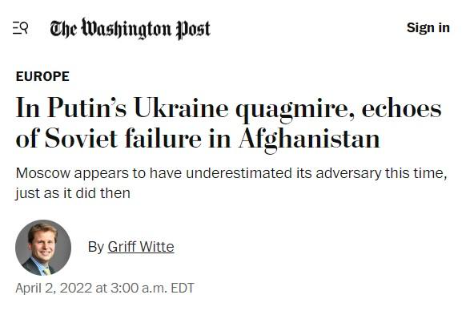Why the comparison between Ukraine and Afghanistan makes no sense, apart from being a distraction from some inconvenient truths.
The Business Insider claims that “Putin’s failing war in Ukraine” might cause a “bleak future” for Russia similar to the “failed war in Afghanistan that helped bring down the Soviet Union.” The Washington Post talked about “Putin’s Ukraine quagmire echoing the Soviet failure in Afghanistan” and Foreign Policy (FP) asks: “Will Ukraine be Afghanistan all over again for Russia?” Among other prophets, a U.S. senator had predicted that Ukraine would become Russia’s “new Afghanistan” in the event of a Russian invasion. And, as was to be expected, the media of other Western countries also parroted the narrative of the American leading media.
The message conveyed by Western politicians, pundits and media types is clear: “Moscow acted imperialistically, in violation of international law, and criminally in Afghanistan: the same in Ukraine.”
The last Soviet troops left Afghanistan in February 1989. This should undoubtedly be the starting point of a comparison to the current invasion of Ukraine. The USSR ended up being officially abolished about two years later. Few comparators add a disclaimer before drawing a parallel: “Of course, the Soviet Union did not fall solely as a result of the invasion of Afghanistan.” Even with this qualification, the claim does not become more true.
Investopedia explains: “The USSR’s weakened military and economy following World War II saw an initial boost from communist politics and economic direction. However, soon this economic system could not compete on the global stage. Along with public dissatisfaction with President Gorbachev’s policies of perestroika and glasnost, the Soviet Union ultimately failed.”
Late response
China, then a country with a very similar political and economic system, took a different path under the reformer Deng Xiaoping, who saw the improvement of people’s living conditions as the most important task. All other reforms, including political ones, had to serve this main goal, in his opinion. He considered it utterly foolish for the Soviets to follow the Western model and give priority to political reforms, as they did at the time. After meeting with Gorbachev, Deng expressed his opinion of the Soviet president: “This man may look smart but in fact is stupid.”
The Soviet Union’s invasion of Afghanistan was stigmatized in the West as an imperialist act that violated international law, as was Russia’s invasion of Ukraine. However, the renowned political scientist John Mearsheimer of the University of Chicago explains with regard to Ukraine that Russia did not act out of an alleged imperialist expansionism, but from a position of strategic defensive:
It was a late reaction in 2022 to a U.S.-instigated coup against a democratically elected government in 2014 that was replaced by a NATO-allied crypto-fascist regime hostile to Russia and the Russian-speaking majority in the East, as I have detailed here, among other things.
The “freedom fighters” of the West
The claim that the Soviet Union invaded and occupied Afghanistan to enlarge itself is utter nonsense, to say the least. In Afghanistan, a communist government was in power that wanted to implement progressive reforms and was threatened in its existence by fundamentalist maniacs. The Soviet Union wanted to come to its aid. For whatever one may think of the Soviet Union and communism: for the Afghan population, first and foremost for the women, for the illiterate, for the poor and the downtrodden, it was a blessing, a ray of hope, the departure from the dark middle ages on the way to the 20th century. The then Afghan president Najibullah who wanted to introduce a multiparty system and had schools for girls built throughout the country, was later brutally assassinated by the Islamist “freedom fighters” that the United States was arming and celebrating at the time: The Taliban first castrated Najibullah and then dragged his bloodied body behind their truck through the streets of Kabul before he was hung in public from a pole.
Thanks to more than $2 billion in weapons, logistical support and training the CIA channelled to the Mujahideen between 1979 and 1989, they defeated the progressive regime and the Soviet troops backing it in Afghanistan.
U.S. delivery of Stinger missiles were critical to the Soviet Union’s retreat. Subsequently, the so-called “freedom fighters” of the Mujahedin established a medieval, misogynistic, religious madness glorifying regime – and became a hotbed of international terrorism, offering themselves as a base of operations for a myriad of terrorist organizations – Bin Laden also made use of this with pleasure.
The wrong grounds for comparison
When the United States had enough of this after the 9/11 terror attack, they tried to intervene militarily in Afghanistan themselves – ultimately just as unsuccessfully as the Soviet Union. To their particular chagrin, they found that American Stinger missiles made no distinction between Soviet or U.S. helicopters. The U.S. had bred itself a hotbed of fundamentalist terror here and had equipped the so-called “freedom fighters” with weapons that the latter were using from then on against the U.S. The American empire got a taste of its own medicine.
When it finally got fed up after a 20-year illegal war of aggression, they left in a hurry, leaving behind a devastated country with a hungry population and women and girls without rights. They also seized billions of U.S. dollars from Afghanistan’s central bank, which the country desperately needed to provide food for its starving population. Unlike the absurd parallels of the Soviet intervention in Afghanistan and Russia’s invasion of Ukraine, a comparison of the American withdrawal from Afghanistan with that of Soviet troops is not to be found in the Western media. Such a comparison would probably be too embarrassing for the collective West, which otherwise likes to wave its moral index finger.

